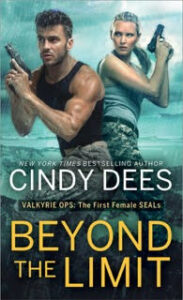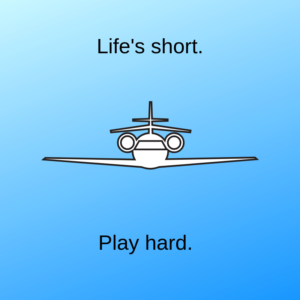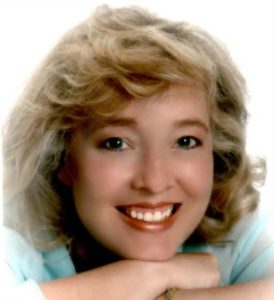 Today I have an interview with award-winning, bestselling author and real-life warrior woman Cindy Dees. Cindy is a former U.S. Air Force pilot, and was in fact the youngest female pilot in its history. I know. She’s so cool. And she’s written a ton of fast paced, swoony books. Over 53, I believe. Her books are so good! These kick-butt novels will have you reading until your alarm goes off for work.
Today I have an interview with award-winning, bestselling author and real-life warrior woman Cindy Dees. Cindy is a former U.S. Air Force pilot, and was in fact the youngest female pilot in its history. I know. She’s so cool. And she’s written a ton of fast paced, swoony books. Over 53, I believe. Her books are so good! These kick-butt novels will have you reading until your alarm goes off for work.
The authenticity of Cindy’s addicting books can’t be denied. Probably because these heart-racing stories weave in Cindy’s harrowing, true-life experiences in the military. The first time I read one of her novels, I was hooked. All this, and she’s a kind, generous person who took time to answer questions even though she is on deadline. You’ll love what Cindy has to say about writing, strong female characters, the military, social media, surviving cancer, and how to foster an adventurous spirit. Enjoy!
DMS: As an NYT and USA Today best-selling author, you have written contemporary romance, romantic suspense, paranormal and fantasy fiction. Most recently you’ve published COLTON UNDER FIRE, which I’m reading and loving. Many writers, myself included, have been told to pick a genre/subgenre and stick with it. Were you conscious of bucking-the-system when you made the choice to write in so many genres/subgenres?
CD: My first literary agent wisely told me not only to pick one bus, but to pick one seat on the bus. I did that, choosing to write military romance since I was ex-military myself and knew the topic well. (Also, it allowed me to lazy with research because I wrote about aspects of military life I already knew very well!)
Now and then, Harlequin would ask me to write something else. I’ll never forget the first time they asked me to put a baby in a book. I asked my editor what on earth I was supposed to do with a baby. She assured me in the strongest of terms that I could neither kill the baby nor kidnap the baby. Not that she knew how my mind works, or anything…

Funny thing, but the baby books did great.
After about 40 military romances, though, I found myself getting antsy to write other types of stories. My agent reluctantly let me branch out into some other genres and write a few books of my heart while I continued to write military romances. It probably wasn’t great for my career to expand into other genres, but it kept be from burning out as a writer and taught me a lot about writing in the process.
DMS: All of your books have fierce female leads, but I’m in love with the idea for the Medusa Project—an all-female Special Forces team. You introduced this concept in 2009, earning two RITA nominations for the series. In 2019 the Medusa Project is coming back with new books. Woohoo! What made you decide to revisit the series? Anything to do with the recent #Metoo movement?
CD: I never wanted to leave the Medusa series in the first place. The marketing department at Harlequin told me that women only wanted to read about strong men and made stop writing Medusa stories.
The decision to revisit them came from Harlequin as well. I got a phone call last summer from my editor, out of the blue, asking me if I’d like to stop everything I was doing for them and write three new Medusas stories as fast as possible. I’m absolutely certain the #metoo movement was the reason for that call. All the major publishers were looking for ways to write about strong, independent women in control of their lives. I don’t know how it went down at the actual marketing meeting, but I envision someone leaning forward over their cup of coffee and saying, “Didn’t we have some stories about kick-butt women a few years back? What was that series again?”
Interestingly enough, 48 hours after I got the call from Harlequin, I got a call from Sourcebooks asking me if I had any stories I could submit to them about strong women in the military. I so happened to have just finished a proposal for a series of books about the first female Navy SEALs, and they bought it on the spot. That series also launches this summer with a fun and sexy book called BEYOND THE LIMIT.

In reality, folks in the SEAL world expect a woman to meet the SEAL fitness standards within the next five years or so, and they think she’ll probably come out of the Crossfit community. TheCrossfit gyms and fitness programs were originally invented by a former Navy SEAL for people in extreme sports to condition.
Honestly, my big concern was that a woman would make the teams before I could get my book written and published!
DMS: I love this part of your biography, “Cindy Dees started flying airplanes while sitting in her dad’s lap at the age of three and got a pilot’s license before she got a driver’s license.” Oh man, so cool. You went on to become the youngest pilot in Air Force history. You flew some pretty bad-a** planes. Where did this courage come from? Were you born with it? Or is there a way some of us less courageous people could manufacture it? You know a mantra that we can use like a Rocky theme song to play on repeat when life seems overwhelming?
CD: I guess I’ve never stopped to think about it taking courage to fly. It’s significantly safer than driving in a car, that’s for darned sure! For me, flying has always been about freedom. It’s a really glorious sensation to leave the earth behind and soar with the birds. It also gives you a new and different perspective on planet earth to look at it below you and know you’re no longer standing on it. It makes you feel bigger—and smaller—as a human being.
As for a life mantra, mine has always been, “Life’s short. Play hard.”

I had cancer a couple of years ago, but we were fortunate to catch it ridiculously early (ladies, go get your annual mammogram NOW if you’re due!), and I’ve been declared cured. But that experience only reinforced my mantra. Life is, indeed, short. And we should all live it to the fullest that we can.
How sad would it be to reach the end of my life and look back on it only to see all the things I hadn’t done, the experiences I chickened out on having, the people I was afraid to love, or the chances I should have taken but was too scared to? After all, it’s not like we get a do-over.
DMS: You’ve written a lot of books—over 50—and have put out as many as six titles in a single year. Do you have a certain word count that you strive to reach daily or do you have big gulps of activity mixed with breaks?
CD: Both! I typically know about how fast I need to write to make a deadline, and I do keep an eye on where I am in my overall word count. But I tend to fly through the opening several chapters at the speed of heat, and then hit a wall where I have to stop and really develop the story. Then I get another big chunk of it worked out and tend to fly through that. About a hundred pages from the end, I’m usually heading into the big action leading up to the climax, and that always goes fast.
Fast for me is in the range of fifteen to twenty pages a day. On writing retreats, I typically infuriate my fellow writers if I’m on a roll, because I’ll sit down, start typing as fast as my fingers can go, and will keep going that fast for four or five hours.
To anticipate your follow up writer question of how I manage to do that, I picture scenes in my head, playing like a movie, before I write them. I envision the characters, the action, the conversation, the emotions, the setting, etc. Then, when I actually sit down to write out the scene, it’s purely a typing exercise for me to describe what I’ve already imagined. Which is to say, I don’t really compose while I’m typing when I’m writing fast.

DMS: You’re an animal lover and advocate for animal rights—probably why you’re a vegan—would you like to share some of your favorite charities/animal rescue organizations?
CD: That are a BUNCH of great animal rescue groups out there. I personally love the groups that scrape up unloved animals off the street, rehab them, and find them homes. Those videos online always give me all the feels.
I’m personally a big supporter of groups that place dogs (typically rescue dogs) in prisons for inmates to train and then permanently place those dogs with veterans to help out as emotional support dogs, service dogs, or companion dogs. Those programs seem to hit all the best things that dogs can do for human beings and that human beings can do for dogs.
DMS: You’re a smart woman with a lot to say on so many important and timely topics. I’m actually a bit in awe of your ability to speak your mind online. In today’s social-media world a lot of people, especially women, face blowback for expressing any opinion on any subject. Has this ever happened to you? Have you ever thought of holding back and just sticking to posting cute pictures of fluffers? What advice would you give writers who want/need to express their opinions on how to navigate the online minefield?
CD: Oh gosh, I’ve gotten flamed like a big dog a time or ten. I do have a few rules for myself about posting topical stuff online, though. First, I try to be relatively even-handed and bi-partisan politically. We’re all entitled to our own opinions, and it’s not my place to tell anyone they’re right or wrong. Second, I DO MY HOMEWORK. I always check out stories or facts or statistics from the most reputable news sources I can before I quote them. Every now and then, something gets past me and it turns out not to be accurate, but I try really hard to back up anything I say with some fact-checking before I post it. That cuts down a LOT on the flaming. Third, I try to talk about topics that all Americans, regardless of personal beliefs or political leanings, might find interesting or useful to know.
My advice for writers: Do NOT be political if you plan to write for a major publishing house. Just this past weekend, the executive editor of a big publisher you’d all know said she’s passing on buying from some fantastic authors and some really successful authors because they’re too political on their social media. Her point was NOT that they had to agree with some corporate point of view. Rather, she said that in polarized time like these, her company can’t afford to work with writers who’ve already alienated a large portion of their potential buying audience. It’s a business decision for the publisher.
While one of the beauties of self-publishing is that you get to say exactly what you want to on the page, the publisher has a point. If you want to maximize your potential audience, charting a course along middle ground is prudent. Frustrating, but prudent.
DMS: If they ever did a Naked and Afraid for writers, would you sign up? Yeah or nay? Yes, the show is on as I write this interview, but I am seriously interested in your answer! 
CD: Oh, hell no. I already did survival school, thank you very much. I already know how to skin a rabbit or eat a grasshopper safely. I do NOT need to do that again. As an Air Force pilot, I had to do a month of surviving in the woods, living off the land with only a knife, a parachute, and water purification tablets. Then we did evasion training, where bad guys chased us through the woods for a week or so while we continued to survive. (And yes, the beat the heck out of us if they caught us.) Then, I finished up with a week of prisoner of war training, which was, in a word, hell.
While I’m really glad I did all of that once, in my twenties, while young and super fit, and I learned a series of life lessons I wouldn’t trade for the world, I would never, ever, voluntarily do all of that again.
A HUGE thank you to Cindy Dees who took time out and away from being on deadline to give us these inspiring, informative, and funny answers. This is one of my most favorite interviews so far! You should definitely follow Cindy on Facebook and on Twitter. And since I know you’re dying to get your hands on some of Cindy’s books, you can find her work HERE or HERE or HERE.

New York Times and USA Today bestselling author, Cindy Dees started flying airplanes while sitting in her dad’s lap at the age of three and got a pilot’s license before she got a driver’s license. At age fifteen, she dropped out of high school and left the horse farm in Michigan where she grew up to attend the University of Michigan.
After earning a degree in Russian and East European Studies, she joined the U.S. Air Force and became the youngest female pilot in its history. She flew supersonic jets, VIP airlift, and the C-5 Galaxy, one of the world’s largest cargo airplanes.
She also worked part-time gathering intelligence. During her military career, she traveled to forty-two countries on five continents, was detained by the KGB and East German secret police, got shot at, flew in the first Gulf War, met her husband, and amassed a lifetime’s worth of war stories. Cindy has turned many of her experiences into novels of military romance and suspense.
Cindy’s hobbies include professional Middle Eastern dancing, Japanese gardening, and medieval reenacting.
Winner of a Golden Heart and Holt Medallion for writing, Cindy is a five-time finalist and two-time winner of the prestigious RITA Award for Romance Fiction, two-time winner of RT Book Review’s Best Harlequin Romantic Suspense Novel of the Year, and is a Romantic Times Lifetime Career Achievement nominee.
Her 53rd romance novel was recently published, and she’s looking forward to the release of her third epic fantasy novel with co-author, Bill Flippin, in January 2018.

I am a mother and I really needed this info thanks!
Thank you!!